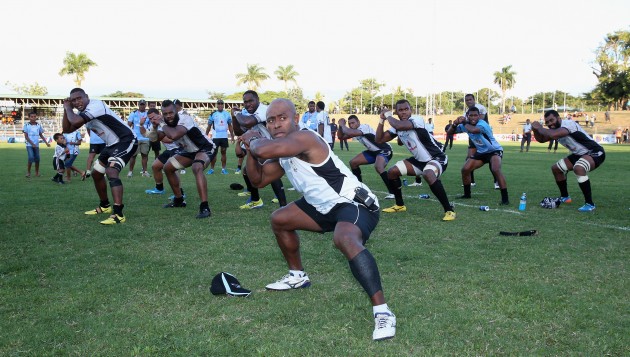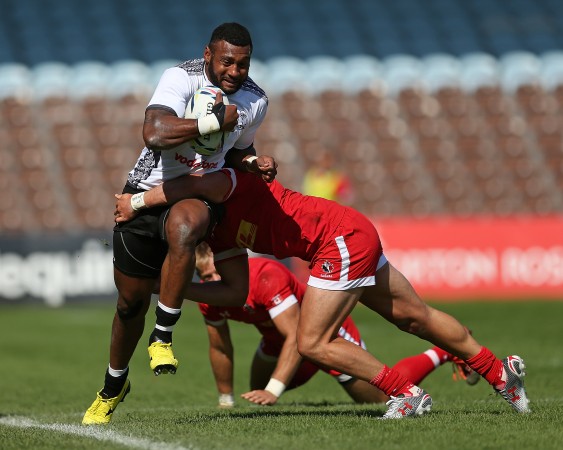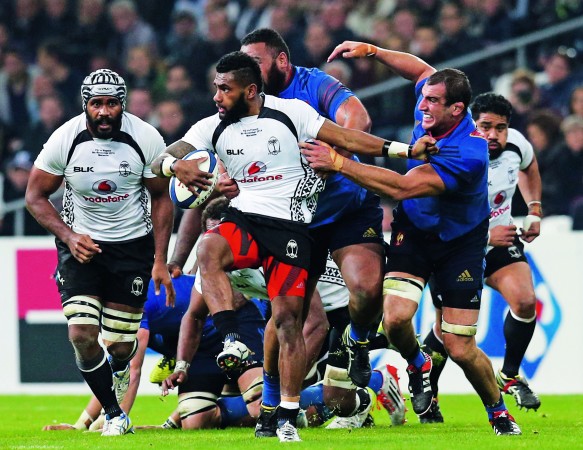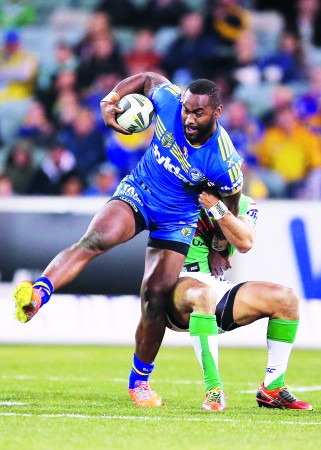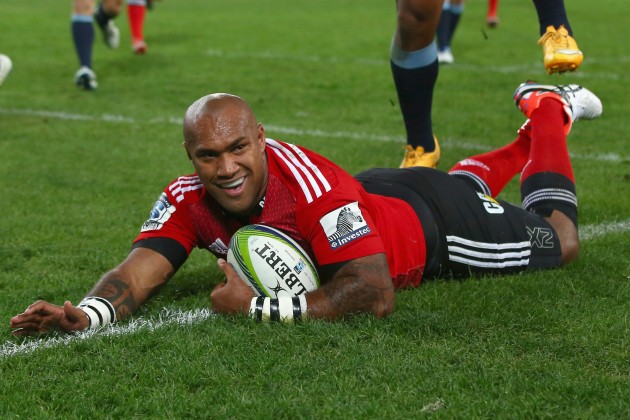This feature first appeared in the January 2015 issue of Rugby World magazine
ON THE outskirts of Perthshire, Mosese Rauluni takes one look out of the window and shouts at the very top of his voice: “Stop the bus!”
The driver slams on the breaks and before he knows it, the Dundee High FP flyer emerges from the bus, two pints in hand, giggling in delight. He has never seen snow before.
His Scottish team-mates look on in bemusement – they had not really known this Australian-reared playmaker for long, though his brother Jacob did play for the club before and Mosese had given a good account of himself in a first outing against Kilmarnock – but there was something endearing about a thrilled Rauluni falling onto his back in the freshly lain powder and laughing.
He hadn’t been in Europe for long, but the Fijian was definitely going to make the most of his opportunity…
This was in 1997. Skip the track to 2014 and Rauluni, a former captain of Fiji and the national team’s defensive coach for their recent tour matches against France, Wales and the USA, now sees the difficulty of pulling the best players together to wear the warriors’ white.
“Back when I was playing, three quarters of the team were based in Fiji,” Rauluni says. “The rest were overseas but we didn’t have depth. There are a lot better players now and a broader base, but many are in France or Australia, or a few in New Zealand’s ITM Cup. That’s never going to change now.”
The issue for Fiji, who will play England at Twickenham in the first showdown of the 2015 Rugby World Cup, is that they never get time together as a squad. The diaspora of their talent across the globe is allied with a lack of resources on their own islands and pressure from wealthy club owners elsewhere on Fijian stars to stay with their sides as much as possible.
This is not conducive to Test team cohesion. It is put forward as one of the reasons why Fiji outstrip expectations at World Cups, because they have finally had time together, but at any other period the Flying Fijians are battling to lay down even basic tactics as players come in mere days before Test matches.
You will have seen Fiji’s best players: when it comes to the latter stages of European competitions, many of the fat-cat sides have an islander or two waiting on the wings. The problem for an international coach is that out in Europe where the Fijian union-ites have no say on how their boys are coached, talent can be pushed around and mismanaged.
“I will never back-stab a bloke if he goes somewhere to make money,” claims Rauluni, who understands the need for Pacific Islanders to earn cash for their families. “But they have got to be honoured, and you get good boys at sh** French clubs who fall off the radar. These fellas see: ‘€2k a month – whoah! That’s massive!’ But it’s not what they think, they are far from home and can slide into depression – I’ve seen it happen.
“We have outstanding outside backs coming out of the woodwork, but no front-rowers. No one wants to learn about the set-piece and we have to rely on a few props playing in Australia – not the best breeding ground for scrummagers – or guys that can get pulled into the system when playing ITM Cup. There are loopholes for people to come back to their nation if they have a passport, but Salesi Ma’afu is never going to play sevens!
“Then we’ve had so many nines and tens who make their way up to France. We need specialists in key positions like props and half-backs, but the playmakers just get put on the wings. They need to be working on their skills but people think, ‘Fijian? He can play wing.’”
Despite the distance, France casts a shadow over the Fijian islands. Rauluni says there are cloak-and-dagger rumours of a Fiji Rugby Union official who claims commission for every player departing for France. For obvious reasons he will not say whether he believes that or not. However, you don’t have to sidestep far to find someone else who distrusts the French.
Fiji’s sevens coach Ben Ryan has been watching as French clubs Brive and Clermont set up shop on the islands. Brive and Fiji back-row Sisa Koyamaibole said of his side’s base in Nadi: “We are not here to poach players but we are thinking of their future and if they go through the programme, they can also do further studies in France and follow in the footsteps of some well-known players.”
Yet Rauluni worries that Fijians stagnate in terms of skill development in France and Ryan fears it’s far more exploitative than that.
“French sides can bring in any number of Fijians to academies, and because they are not officially in the first-team squad they aren’t classed as ‘overseas’. These ‘academies’ do not bring in any resources, they are not adding to the coaching on the islands. They are just about talent identification for the big sides and if they say anything else they are pretending.”
Ryan tells of how some young Fijians are asked to sign deals in French – “contractual law is hard enough without having to look at it in French!” – and how they also slip away elsewhere. Young stars get dragged into the lower reaches of France, but also Romania and Sri Lanka. Three years in New Zealand earns residency, and these boys won’t be expensive ‘foreigners’.
Australian rugby league is a big draw for young guys too. Speedsters can be offered trials, taken over and put through their paces and discarded right away. Some either hang about until their visas run out, running the risk of permanent deportation, or they vanish. And some, like Semi Radradra of the Parramatta Eels, can be scooped out of the Fijian sevens programme after one tournament on the Gold Coast.
“I could name a whole squad of guys who now play in the NRL or in French academies,” Ryan says. “The talent is still coming through here but it’s thin on the ground and it’s still spread out across the islands. They could play sevens and even for the Flying Fijians, but these talent scouts will find them.
“Look at Alipate Ratini being picked up by Grenoble after the Gold Coast Sevens or Radradra going to NRL after that tournament.”
The sevens programme in Fiji is trying valiantly to retain these guys, but there is less than the equivalent of £500,000 per annum to keep the cream. A top contract with the union could reach £6,500pa – a mere drop compared to what could be garnered in Europe or the NRL.
Current Fiji back Nemani Nadolo, who splits his time between Canterbury Crusaders in New Zealand and the NEC Green Rockets in Japan, feels that because of the lure, many possible world-beaters are slipping through the net.
“There are guys in Oz who could be the best in the world, but who play the equivalent of England’s fourth tier!” he says.
“Family is a big thing for Pacific Islanders: they want to look after their family in the village. So if they can send back money and live on as little as £1k a month, they won’t think about it. Then these French guys are starting to poach players as young as 15.”
So is this abusing the system?
“It’s definitely exploitation,” insists Nadolo. “Fijians are the most sought after imports in France because they are natural freaks. Then you hear rumours of teams putting extra money in players’ pockets to stop them playing for Fiji – that wouldn’t surprise me. It’s disappointing, but beggars can’t be choosers. Some leave (Fiji) and kill it; they work their way up. But they are not exposed to contract dealings, because the game’s pretty much entirely amateur in Fiji. You hear of players being burnt by agents, with deals done under the table. They need education.”
Nadolo praises steps taken in NRL to educate players of Pacific Islands descent, and feels the recently set up Pacific Islands Players’ Association (PIPA) for union stars can do with a leg-up from the IRB. However, he also says there is only so much the world’s governing body can do. The real hard graft comes down to proper allocation of funds, time and education to young players by a home union guilty of being “a bit old-fashioned”.
Rauluni agrees. He’d like to see a volagi (white outsider) CEO come in from Europe, ready to fight for Fiji from a position of experience. They would know how to best work alongside the Clermont production line at Sigatoka, or to allocate funds and work on sending coaches to nearby New Zealand for skill-specific clinics.
Despite the issues, Rauluni looks forward to seeing Fiji in the UK for the World Cup.
“As ever, how we will do in 2015 depends on whether we’re sleeping under the coconut tree or rowing the war boat. But we have players with a lot more experience all over the world, which can only help.
“At the World Cup in ’99 we went out to play and said ‘holy crap!’ when we saw the size of the crowds in Twickenham. We won’t be caught like a deer in the headlights again.”





